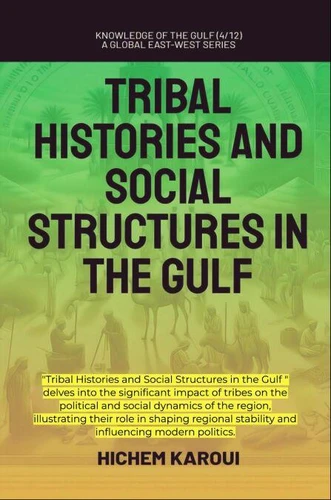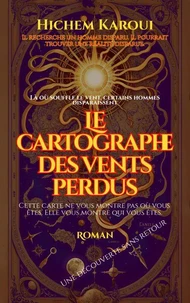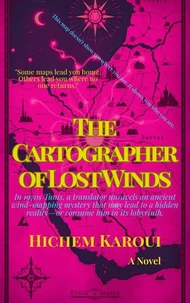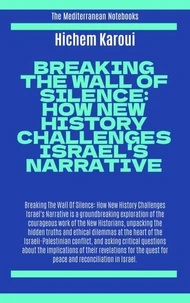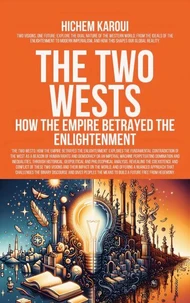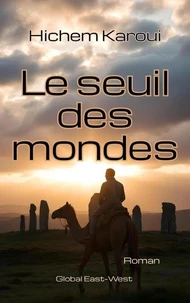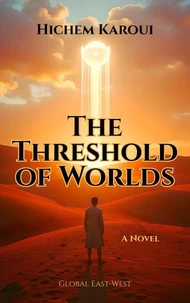Tribal Histories and Social Structures in the Gulf. Knowledge of the Gulf, #4
Par :Formats :
Disponible dans votre compte client Decitre ou Furet du Nord dès validation de votre commande. Le format ePub protégé est :
- Compatible avec une lecture sur My Vivlio (smartphone, tablette, ordinateur)
- Compatible avec une lecture sur liseuses Vivlio
- Pour les liseuses autres que Vivlio, vous devez utiliser le logiciel Adobe Digital Edition. Non compatible avec la lecture sur les liseuses Kindle, Remarkable et Sony
- Non compatible avec un achat hors France métropolitaine
 , qui est-ce ?
, qui est-ce ?Notre partenaire de plateforme de lecture numérique où vous retrouverez l'ensemble de vos ebooks gratuitement
Pour en savoir plus sur nos ebooks, consultez notre aide en ligne ici
- FormatePub
- ISBN8230357230
- EAN9798230357230
- Date de parution19/01/2025
- Protection num.Adobe DRM
- Infos supplémentairesepub
- ÉditeurIndependently Published
Résumé
In "Tribal Histories and Social Structures in the Gulf, " Dr Hichem Karoui intricately weaves together the complex threads of tribal dynamics, unveiling their profound influence on the Gulf's political and social landscape. As the fourth instalment in the acclaimed series "Knowledge of the Gulf, " this volume extends the dialogue, offering a nuanced exploration of the enduring role tribes play in shaping regional governance and stability.
With careful precision, Dr Karoui navigates through historical affiliations and deeply rooted social hierarchies, revealing their lasting imprint on the modern political architecture of the Gulf. In this masterful exploration of Gulf tribal dynamics, Dr Karoui presents a tour de force that transcends conventional academic boundaries. Through his meticulous research and profound understanding, he illuminates the intricate tapestry of tribal relationships that continue to shape the region's socio-political landscape.
The work's significance lies in its ability to bridge seemingly disparate worlds - the ancient and the modern, the traditional and the progressive. Within its pages, readers discover how centuries-old tribal structures have not merely survived but adapted and thrived amidst sweeping changes brought by modernisation and globalisation. Consider the fascinating paradox Dr Karoui unveils: while oil wealth and technological advancement have transformed the Gulf's physical landscape beyond recognition, tribal affiliations continue to exert a subtle yet powerful influence on everything from business dealings to political allegiances.
His analysis reveals how these traditional networks serve as both anchors of stability and catalysts for change. Particularly compelling is the author's examination of what he terms the "tribal-modern interface" - those crucial points where ancient customs meet contemporary challenges. Through carefully chosen case studies and rigorous analysis, he demonstrates how tribal communities have ingeniously adapted their traditional knowledge systems to address modern environmental and social challenges.
The book's exploration of identity dynamics is especially nuanced, revealing how tribal allegiances interact with emerging national identities in ways that both complement and occasionally conflict with one another. This delicate balance, Dr Karoui argues, holds important lessons for understanding social cohesion in an increasingly globalised world. What emerges is not merely a historical account or sociological study, but rather a profound meditation on the enduring relevance of traditional social structures in our rapidly evolving world.
It's a vital contribution to our understanding of how societies can maintain their cultural essence whilst embracing necessary change.
With careful precision, Dr Karoui navigates through historical affiliations and deeply rooted social hierarchies, revealing their lasting imprint on the modern political architecture of the Gulf. In this masterful exploration of Gulf tribal dynamics, Dr Karoui presents a tour de force that transcends conventional academic boundaries. Through his meticulous research and profound understanding, he illuminates the intricate tapestry of tribal relationships that continue to shape the region's socio-political landscape.
The work's significance lies in its ability to bridge seemingly disparate worlds - the ancient and the modern, the traditional and the progressive. Within its pages, readers discover how centuries-old tribal structures have not merely survived but adapted and thrived amidst sweeping changes brought by modernisation and globalisation. Consider the fascinating paradox Dr Karoui unveils: while oil wealth and technological advancement have transformed the Gulf's physical landscape beyond recognition, tribal affiliations continue to exert a subtle yet powerful influence on everything from business dealings to political allegiances.
His analysis reveals how these traditional networks serve as both anchors of stability and catalysts for change. Particularly compelling is the author's examination of what he terms the "tribal-modern interface" - those crucial points where ancient customs meet contemporary challenges. Through carefully chosen case studies and rigorous analysis, he demonstrates how tribal communities have ingeniously adapted their traditional knowledge systems to address modern environmental and social challenges.
The book's exploration of identity dynamics is especially nuanced, revealing how tribal allegiances interact with emerging national identities in ways that both complement and occasionally conflict with one another. This delicate balance, Dr Karoui argues, holds important lessons for understanding social cohesion in an increasingly globalised world. What emerges is not merely a historical account or sociological study, but rather a profound meditation on the enduring relevance of traditional social structures in our rapidly evolving world.
It's a vital contribution to our understanding of how societies can maintain their cultural essence whilst embracing necessary change.
In "Tribal Histories and Social Structures in the Gulf, " Dr Hichem Karoui intricately weaves together the complex threads of tribal dynamics, unveiling their profound influence on the Gulf's political and social landscape. As the fourth instalment in the acclaimed series "Knowledge of the Gulf, " this volume extends the dialogue, offering a nuanced exploration of the enduring role tribes play in shaping regional governance and stability.
With careful precision, Dr Karoui navigates through historical affiliations and deeply rooted social hierarchies, revealing their lasting imprint on the modern political architecture of the Gulf. In this masterful exploration of Gulf tribal dynamics, Dr Karoui presents a tour de force that transcends conventional academic boundaries. Through his meticulous research and profound understanding, he illuminates the intricate tapestry of tribal relationships that continue to shape the region's socio-political landscape.
The work's significance lies in its ability to bridge seemingly disparate worlds - the ancient and the modern, the traditional and the progressive. Within its pages, readers discover how centuries-old tribal structures have not merely survived but adapted and thrived amidst sweeping changes brought by modernisation and globalisation. Consider the fascinating paradox Dr Karoui unveils: while oil wealth and technological advancement have transformed the Gulf's physical landscape beyond recognition, tribal affiliations continue to exert a subtle yet powerful influence on everything from business dealings to political allegiances.
His analysis reveals how these traditional networks serve as both anchors of stability and catalysts for change. Particularly compelling is the author's examination of what he terms the "tribal-modern interface" - those crucial points where ancient customs meet contemporary challenges. Through carefully chosen case studies and rigorous analysis, he demonstrates how tribal communities have ingeniously adapted their traditional knowledge systems to address modern environmental and social challenges.
The book's exploration of identity dynamics is especially nuanced, revealing how tribal allegiances interact with emerging national identities in ways that both complement and occasionally conflict with one another. This delicate balance, Dr Karoui argues, holds important lessons for understanding social cohesion in an increasingly globalised world. What emerges is not merely a historical account or sociological study, but rather a profound meditation on the enduring relevance of traditional social structures in our rapidly evolving world.
It's a vital contribution to our understanding of how societies can maintain their cultural essence whilst embracing necessary change.
With careful precision, Dr Karoui navigates through historical affiliations and deeply rooted social hierarchies, revealing their lasting imprint on the modern political architecture of the Gulf. In this masterful exploration of Gulf tribal dynamics, Dr Karoui presents a tour de force that transcends conventional academic boundaries. Through his meticulous research and profound understanding, he illuminates the intricate tapestry of tribal relationships that continue to shape the region's socio-political landscape.
The work's significance lies in its ability to bridge seemingly disparate worlds - the ancient and the modern, the traditional and the progressive. Within its pages, readers discover how centuries-old tribal structures have not merely survived but adapted and thrived amidst sweeping changes brought by modernisation and globalisation. Consider the fascinating paradox Dr Karoui unveils: while oil wealth and technological advancement have transformed the Gulf's physical landscape beyond recognition, tribal affiliations continue to exert a subtle yet powerful influence on everything from business dealings to political allegiances.
His analysis reveals how these traditional networks serve as both anchors of stability and catalysts for change. Particularly compelling is the author's examination of what he terms the "tribal-modern interface" - those crucial points where ancient customs meet contemporary challenges. Through carefully chosen case studies and rigorous analysis, he demonstrates how tribal communities have ingeniously adapted their traditional knowledge systems to address modern environmental and social challenges.
The book's exploration of identity dynamics is especially nuanced, revealing how tribal allegiances interact with emerging national identities in ways that both complement and occasionally conflict with one another. This delicate balance, Dr Karoui argues, holds important lessons for understanding social cohesion in an increasingly globalised world. What emerges is not merely a historical account or sociological study, but rather a profound meditation on the enduring relevance of traditional social structures in our rapidly evolving world.
It's a vital contribution to our understanding of how societies can maintain their cultural essence whilst embracing necessary change.

